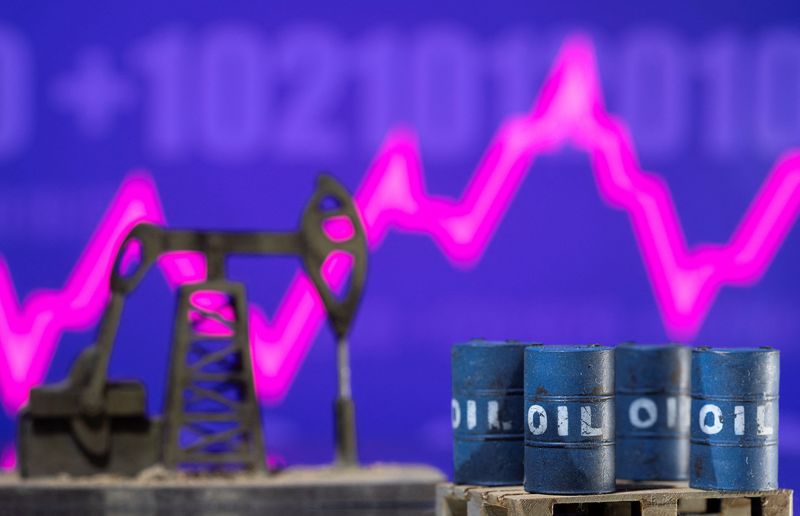By Scott DiSavino
NEW YORK (Reuters) -Oil prices surged over 7% on Tuesday to their highest since 2014, as a global agreement to release crude reserves failed to calm fears about supply disruptions from Russia’s invasion of Ukraine.
Members of the International Energy Agency (IEA), which includes the United States and Japan, agreed to release 60 million barrels of crude from their reserves to try to quell the sharp increase in prices that pushed major benchmarks past $100 a barrel.
However, news of that release – equivalent to less than one day of worldwide oil consumption – only magnified the market’s fear that supply will be inadequate to cover growing disruptions.
Brent futures rose $7.00, or 7.1%, to settle at $104.97 a barrel, their highest close since August 2014.
U.S. West Texas Intermediate (WTI) crude rose $7.69, or 8.0%, to settle at $103.41. That was its highest close since July 2014 and its biggest daily percentage gain since November 2020.
Markets rallied further in thin post-close trading, with Brent surpassing $107 and U.S. crude above $106 per barrel after the American Petroleum Institute, an industry group, said U.S. crude stocks fell by more than 6 million barrels in the most recent week.
In intraday trade, Brent hit its highest since July 2014 and WTI its highest since June 2014. In addition to crude, U.S. heating oil and gasoline futures also hit their highest since 2014.
U.S.-led sanctions on Russia exempted the energy sector, but traders are shying away from trading Russian barrels, leading to big discounts on that oil and tightening supply for other kinds of crude. Across various markets, different grades of oil in the Middle East and elsewhere surged.
Russia’s military move on Kyiv, Ukraine’s capital, has stalled as its forces struggle with food and fuel shortages, with some units apparently gripped by low morale, a senior U.S. defense official said on Tuesday.
“Oil’s climbing the Ukraine war wall of worry,” said John Kilduff, partner at Again Capital in New York. He said traders were disappointed in the size of the release of strategic reserves.
The world’s biggest shipping firm, AP Moeller-Maersk A/S, was halting container movement to and from Russia, while Britain has banned all ships with any Russian connection from entering its ports.
Major oil and gas companies, including BP and Shell PLC, have announced plans to exit Russian operations and joint ventures. TotalEnergies SA said it would not invest further capital in its Russian operations.
The largest supplier of global oil, the Organization of the Petroleum Exporting Countries (OPEC) and allies including Russia, known as OPEC+, have not signaled a desire to boost production beyond their expected 400,000 barrels per day (bpd) increase in April, despite entreaties from the United States and others.
The group is due to meet on Wednesday for a monthly meeting.
“The pledge from OPEC+ to increase supply is so far a paper promise,” said Louise Dickson, senior oil market analyst at Rystad Energy, noting that participating OPEC+ deal members are producing about 800,000 bpd below stated target levels, further squeezing global supplies.
Futures for Brent and WTI through October were in what Robert Yawger, executive director of energy futures at Mizuho, has called “super-backwardation” with each month trading at least $1 a barrel below the prior month.
Backwardation, a market structure where prompt contracts are more expensive than those for later dates, indicates fear of being able to find cargoes in the near-term, as global oil demand has largely recovered from the worst of the coronavirus pandemic while production has not kept pace.
Libya’s parliament approved a new government on Tuesday, but the incumbent administration rejected the vote and vowed not to cede power.
Libya, an OPEC member, produced about 1.2 million bpd of crude in 2021, according to U.S. energy data.
The API figures showed an unexpected drop in U.S. stocks. Government figures will be released Wednesday, when analysts expect the latest U.S. data will show a 2.7 million-barrel increase in crude stocks. [EIA/S] [API/S] [ENERGYUSA] [ENERGYAPI]
(Additional reporting by Laura Sanicola in New York, Julia Payne in London and Muyu Xu in Beijing; Editing by Jason Neely, David Goodman, David Gregorio and Jonathan Oatis)
























